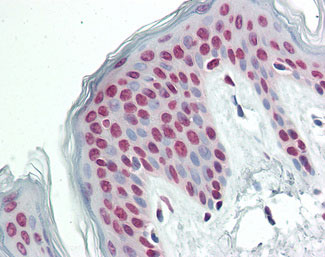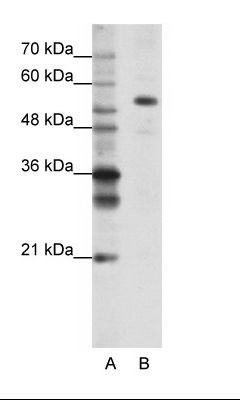FLJ12529 / CPSF7 Antibody (C-Terminus)
Rabbit Polyclonal Antibody
- SPECIFICATION
- CITATIONS
- PROTOCOLS
- BACKGROUND

Application
| WB, IHC-P |
|---|---|
| Primary Accession | Q8N684 |
| Reactivity | Human, Mouse, Rat, Rabbit, Monkey, Pig, Horse, Bovine, Guinea Pig, Dog |
| Host | Rabbit |
| Clonality | Polyclonal |
| Calculated MW | 52kDa |
| Dilution | IHC-P (10 µg/ml), WB (1.25 µg/ml), |
| Gene ID | 79869 |
|---|---|
| Other Names | Cleavage and polyadenylation specificity factor subunit 7, Cleavage and polyadenylation specificity factor 59 kDa subunit, CFIm59, CPSF 59 kDa subunit, Pre-mRNA cleavage factor Im 59 kDa subunit, CPSF7 |
| Target/Specificity | Human CPSF7 / FLJ12529 |
| Reconstitution & Storage | Long term: -20°C, the use of 50% glycerol is recommended if storing aliquots in -20°C for long term use (up to 1 year); Short term (less than one week): +4°C. Avoid repeat freeze-thaw cycles. |
| Precautions | FLJ12529 / CPSF7 Antibody (C-Terminus) is for research use only and not for use in diagnostic or therapeutic procedures. |
| Name | CPSF7 (HGNC:30098) |
|---|---|
| Function | Component of the cleavage factor Im (CFIm) complex that functions as an activator of the pre-mRNA 3'-end cleavage and polyadenylation processing required for the maturation of pre-mRNA into functional mRNAs (PubMed:8626397, PubMed:17024186, PubMed:29276085). CFIm contributes to the recruitment of multiprotein complexes on specific sequences on the pre-mRNA 3'-end, so called cleavage and polyadenylation signals (pA signals) (PubMed:8626397, PubMed:17024186). Most pre-mRNAs contain multiple pA signals, resulting in alternative cleavage and polyadenylation (APA) producing mRNAs with variable 3'-end formation (PubMed:23187700, PubMed:29276085). The CFIm complex acts as a key regulator of cleavage and polyadenylation site choice during APA through its binding to 5'-UGUA-3' elements localized in the 3'- untranslated region (UTR) for a huge number of pre-mRNAs (PubMed:20695905, PubMed:29276085). CPSF7 activates directly the mRNA 3'-processing machinery (PubMed:29276085). Binds to pA signals in RNA substrates (PubMed:8626397, PubMed:17024186). |
| Cellular Location | Nucleus. Cytoplasm Note=Shuttles between the nucleus and the cytoplasm in a transcription- and XPO1/CRM1-independent manner, most probably in complex with the cleavage factor Im complex (CFIm) (PubMed:19864460) |
| Volume | 50 µl |

Thousands of laboratories across the world have published research that depended on the performance of antibodies from Abcepta to advance their research. Check out links to articles that cite our products in major peer-reviewed journals, organized by research category.
info@abcepta.com, and receive a free "I Love Antibodies" mug.
Provided below are standard protocols that you may find useful for product applications.
Background
Component of the cleavage factor Im complex (CFIm) that plays a key role in pre-mRNA 3'-processing. Binds to cleavage and polyadenylation RNA substrates.
References
Rueegsegger U.,et al.Submitted (MAR-2000) to the EMBL/GenBank/DDBJ databases.
Ota T.,et al.Nat. Genet. 36:40-45(2004).
Bechtel S.,et al.BMC Genomics 8:399-399(2007).
Taylor T.D.,et al.Nature 440:497-500(2006).
Rueegsegger U.,et al.J. Biol. Chem. 271:6107-6113(1996).
If you have used an Abcepta product and would like to share how it has performed, please click on the "Submit Review" button and provide the requested information. Our staff will examine and post your review and contact you if needed.
If you have any additional inquiries please email technical services at tech@abcepta.com.













 Foundational characteristics of cancer include proliferation, angiogenesis, migration, evasion of apoptosis, and cellular immortality. Find key markers for these cellular processes and antibodies to detect them.
Foundational characteristics of cancer include proliferation, angiogenesis, migration, evasion of apoptosis, and cellular immortality. Find key markers for these cellular processes and antibodies to detect them. The SUMOplot™ Analysis Program predicts and scores sumoylation sites in your protein. SUMOylation is a post-translational modification involved in various cellular processes, such as nuclear-cytosolic transport, transcriptional regulation, apoptosis, protein stability, response to stress, and progression through the cell cycle.
The SUMOplot™ Analysis Program predicts and scores sumoylation sites in your protein. SUMOylation is a post-translational modification involved in various cellular processes, such as nuclear-cytosolic transport, transcriptional regulation, apoptosis, protein stability, response to stress, and progression through the cell cycle. The Autophagy Receptor Motif Plotter predicts and scores autophagy receptor binding sites in your protein. Identifying proteins connected to this pathway is critical to understanding the role of autophagy in physiological as well as pathological processes such as development, differentiation, neurodegenerative diseases, stress, infection, and cancer.
The Autophagy Receptor Motif Plotter predicts and scores autophagy receptor binding sites in your protein. Identifying proteins connected to this pathway is critical to understanding the role of autophagy in physiological as well as pathological processes such as development, differentiation, neurodegenerative diseases, stress, infection, and cancer.



